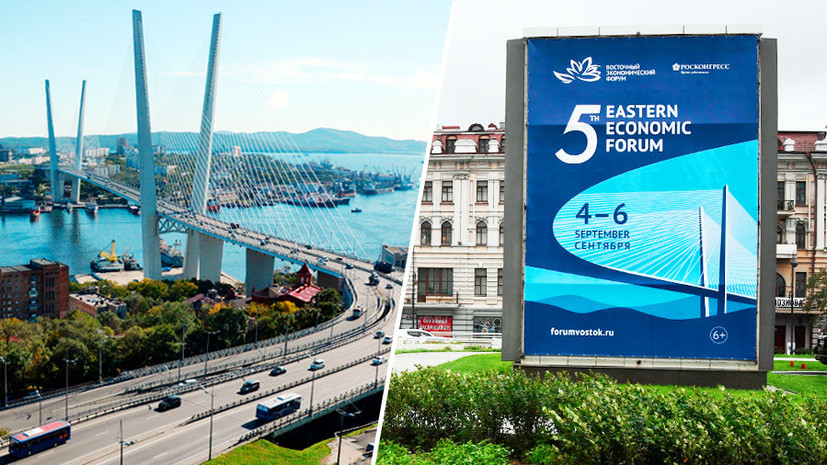For the fifth year in a row, the Eastern Economic Forum (WEF) takes place on the campus of the Far Eastern Federal University. According to the forecasts of the organizers, in 2019, more than eight thousand delegates from 65 countries will come to the anniversary forum.
“We are waiting for more guests. The numbers exceed eight thousand people - 8.2 thousand are expected from 65 countries of the world. The forum is of interest, which means we are conducting it correctly, ”said Yury Trutnev, Deputy Prime Minister and Presidential Envoy to the Far Eastern Federal District.
The central event of the WEF will be the plenary meeting on September 5, at which a speech is expected by Russian President Vladimir Putin, Japanese Prime Minister Shinzo Abe, Indian Prime Minister Narendra Modi, Mongolian President Khaltmaagiin Battulga and Malaysian Prime Minister Mahathir Mohamad.
By tradition, the Asian states are most interested in the forum and investment projects of the Far East. Now over 70% of all foreign investments in the region are made in China, about 10% - in South Korea, 5% - in Japan. This was in a conversation with RT, said Minister for Development of the Far East and the Arctic, Alexander Kozlov.
“In the past five years, the Far East has collected a third of all foreign direct investment that came to Russia. I am deeply convinced that the Eastern Economic Forum made a significant contribution to this, where state leaders and heads of major companies say that investing in the Far East is profitable today, ”Kozlov emphasized.
According to the Minister, in addition to cooperation with China, Japan and South Korea, the activity of entrepreneurs from India has noticeably increased. KGK diamond cutting company is already operating in the Free Port of Vladivostok, and in the next year and a half, M.Suresh, the largest diamond producer in India, will launch its project.
Asian investors are also interested in the Russian oil and gas sector, Oleg Remyga, professor of the EMBA for Eurasia program at the Skolkovo business school, added in an interview with RT. According to him, many states of the region are deprived of the necessary energy resources, so they are purchased in Russia. Thus, countries are interested in investing in joint energy projects.
Experts also talk about the importance of the Russian agricultural sector for Asian countries. The President of the Chamber of Commerce and Industry (CCI RF) Sergey Katyrin, speaking with RT, cited the example of the Jewish Autonomous Region, where almost 80 out of 80 enterprises with 100% Chinese capital are in the agricultural sector. Now agricultural producers from China rent 34% of the total sown area of the region.
“Asian countries are limited in their ability to produce agricultural products. Russia has huge potential in agriculture. The stimulus for the development of the agricultural industry was sanctions. For example, last year Russia became the main supplier of wheat to the Chinese market, ”Oleg Remyga said.
Active inflow of investments into the region is reflected in the turnover of goods. According to the FCS, in 2018, the volume of trade with China grew by 24.5% and for the first time reached $ 108 billion, with India - increased by 17.3% (up to $ 10.9 billion), with Japan - by 16.5% ( to $ 21.3 billion), with South Korea - by 28.8% (up to $ 24.8 billion).
“The advantages of East and Southeast Asian countries as trading partners are becoming ever more tangible. The general market covers more than 2 billion consumers, on which there are preferential conditions for the movement of goods, services, capital, and labor. The average rate of GDP growth among ASEAN countries is 5.2%, which makes the market quite promising from the point of view of Russian business representatives entering it, ”said Sergey Katyrin.
According to him, Russian private and state companies are interested in Asian agricultural projects, as well as in cooperation in the fishing industry, metallurgy, shipbuilding and aircraft manufacturing, pharmaceuticals, railway and port construction.
The Eastern Economic Forum was first held in 2015 by decree of Vladimir Putin. Work at the WEF takes place in the form of panel sessions, round tables, television debates, business breakfasts and business dialogs. Last year, the forum hosted more than 100 events, and more than six thousand delegates from 60 countries attended the business site itself.
For five years, 731 agreements were signed on the fields of the WEF for a total of 8.75 trillion rubles. Last year alone, 220 agreements worth 3.1 trillion rubles were concluded.
The largest investment projects for the entire duration of the forum, experts include the agreement of the Corporation for the Development of the Far East JSC with the East Petrochemical Company JSC on the creation of petrochemical plants (transaction amount - 630 billion rubles), as well as the Amur Gas Chemical Complex project between the Ministry of Eastern Development Russia and PJSC Sibur Holding (500 billion).

